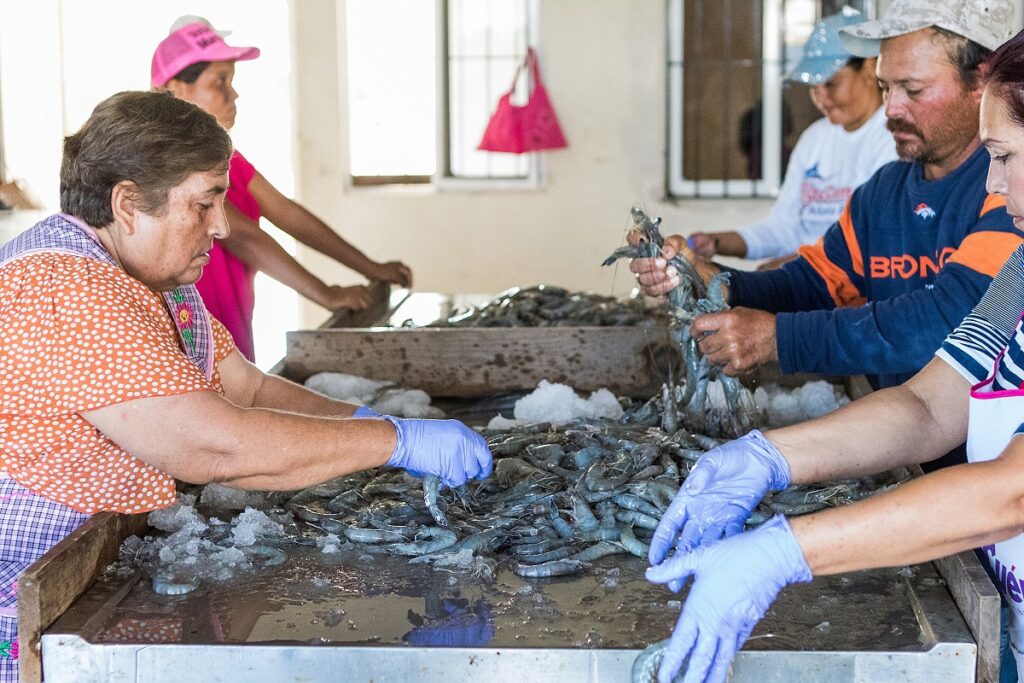In March of 2020, COVID-19 pandemic swept across the globe creating economic and social impacts across all sectors. At Iberostar, as we reflect on ways to build back a better and more responsible tourism model, we took a deeper look at how the pandemic affected small-scale fisheries and identified emerging lessons that help us reduce the impact of crises (such as climate change) that we know will come.
As society shut down with the goal to control the spread of the disease and flatten the curve, demand for seafood and subsequently, fishing activity, were dramatically reduced in some areas. With the closures of restaurants and hotels, foodservice providers also had to find new markets for their existing seafood products, often having to repack products to meet increasing demand for frozen seafood at retailers or opening their doors to sell directly to end-consumers.
According to the Food and Agricultural Organization (FAO) of the United Nations, “capture fisheries support the livelihoods of over 120 million people [and] small-scale fisheries produce two-thirds of catches destined for direct human consumption and provide 90% of the employment in the sector.”
In a report shared by the Global Fishing Watch, fishing activity globally decreased significantly after the World Health Organization (WHO) declared COVID-19 a pandemic on March 11th. Low demand, falling prices, and seafood market closures contributed to the decline, particularly in areas where nationwide lockdowns were enforced. Border closures and subsequent lack of access to port services like fuel and bait resulted in vessels remaining at sea for longer periods of time.
Fishing activity in the Peruvian vessel monitoring system dropped approximately 80 percent after the Peruvian government declared a stay-at-home order in response to the COVID-19 pandemic on March 16, 2020. Artisanal fishing activity, though also reduced significantly, continued catching important species for domestic consumption, which in turn helped create “an increased understanding of the importance of artisanal fishers” amongst Peruvians. The rise of campaigns such as “Keeping Fishing COVID-19 Free” to reduce the spread of COVID-19 before, during, and after the fishing activity have created resources that are free to download and can be shared with the fishing sector. Future of Fish also launched a campaign in partnership with fishers from La Islilla, Peru, to provide personal protective equipment (PPE) to the fishers and seafood workers who need it most.
Whereas industrial fishing decreased globally, satellite tracking data indicated that illegal fishing appeared to spike during the Philippines’ lockdown period as commercial fishers took advantage of decreased patrolling to fish in coastal waters that they traditionally are not able to fish in. The suspension of onboard observers and other measure controls to prevent the spread of COVID-19 weakened the oversight of fishing operations. In Brazil, with most of the federal government’s environmental agency staff working from home, artisanal fishermen from different parts of the country have been reporting increasing illegal activity. “Monitoring operations here have been insufficient for decades,” says Jorge Oliveira, an environmental activist. “Now, with the pandemic, there isn’t any kind of control. The industrial fishermen know that.”
With the stay-at-home order, fish market closures and decrease in traditional distribution channels, created opportunities for the development of more direct fish marketing and home delivery services. In Manaus Brazil, for example, to help prevent infection in local markets, the Manaus’ City Hall launched a project for fish delivery, in partnership with fish farms in the region. Though it was limited in its reach, it serves as an example of ways local fishermen had to redirect efforts to access domestic markets. In South Africa, Abalobi, developed a mobile app to promote traceable seafood into local markets and help sell directly to buyers.
Lack of government support specific to small-scale fisheries was felt globally and there were few initiatives aimed at this sector. Women in African artisanal fisheries were particularly affected as they earn a living on a day-by-day basis. Rovina Europa, a fisherwoman from Arniston on the Cape south west coast and a Coastal Links leader said “women […] put food on the table, and now have to teach their children who cannot go to school. They also play a significant role pre-harvest (of fish) by preparing men to go fish. Post-harvest they clean fish and involve themselves in other money-making activities such as making jewellery. None of these activities are permitted under the lockdown regulations so they are struggling to make a living.”
With global fishing efforts reduced during lockdown, did fish stocks have a chance to recover? According to an article published by the Smithsonian Magazine, “a slowdown of at least a year would allow most fish to go through their spawning cycle […] Most European fish stocks (whitefish, flatfish, herring) will nearly double their biomass within one year without fishing. So, reduction in catch caused by coronavirus will lead to an increase in fish biomass,” said Rainer Froese of the GEOMAR Helmholtz Centre for Ocean Research in Germany. Froese said this could benefit about 40 percent of the stocks currently being overfished.
Nonetheless, recovery of fish stocks is still mainly anecdotal, and for Nick Graham, professor at Lancaster University in the U.K. and co-author of a study analyzing fish populations in over 1,800 tropical coral reefs in 41 countries, “the recovery of diversity and fish numbers is a slow process and the experience in marine protected areas shows a full recovery can take as much as two decades.”
COVID-19 lockdown had a tremendous impact in the seafood industry as it affected small-scale fisher’s ability to fish, their access to transportation and markets, with prices plummeting when unable to export their high value catch to buyers in countries like China. Closures of restaurants, fish markets, hotels and cancellation of events and venues in order to contain the spread of the virus also contributed to the lack of access to market and their inability to sell their catch.
According to the FAO, the “sector faces multiple challenges, including: declining fish stocks; competition from other sectors (e.g. industry, tourism); few alternative livelihoods, weak representation and voice in resource management.” These challenges were further exacerbated by the pandemic and raised the question of what are potentially lessons learned to help prepare small-scale fisheries to face climate change and ensure food security and the livelihoods of those depending on this activity.

What we’ve experienced in the pandemic is not all too unfamiliar. A lot of these same trends have been predicted for the impacts of climate change on small-scale fisheries. For instance, access to fishing activity has been reduced by COVID-19, but climate change effects such as increased sea temperature and current flows, affect the abundance and distribution of fish stocks, which limits small-scale fisher’s access to this resource. Similarly, extreme weather events keep fisher’s from being able to fish and contribute to market disruptions. Communities’ livelihoods and infrastructure are impacted by sea level rise, sea surges, typhoons and rainfall intensity; which further limits and disrupts fishing activity as fishers heavily depend on weather stability to resume operations.
In addition, proposed solutions to counteract the effects of climate change, such as the creation of Marine Protected Areas have had the unintended consequence of displacing fishermen and limiting their ability to generate income when alternative livelihood opportunities are not created in parallel with the MPA work.
What are the lessons learned from negative impacts of the pandemic on small-scale fisheries that we can change to better prepare us for those expected from climate change?
Empowering small-scale fisheries to be a part of the conversation and the decision-making process is imperative (whether it’s a pandemic or climate change policies) since they are the most affected by both and they often lack proper representation and infrastructure as their communities may be poverty stricken. Creating alternative livelihoods and diversifying their economic activities help offset some of these challenges. Access to technology advances has also proven key to be able to not only be informed of policy changes and risks during a crisis but also provide opportunities to quickly adapt to challenges. Education and engagement is also important, how can they participate in the conversation if they are not aware of the problem? A lot of misinformation affected small-scale fisheries during the pandemic, and as for climate change their ability to understand what this means and how it can affect them so that they can be a part of co-creating solutions to address these challenges is necessary.
At Iberostar, we hold even greater conviction in our roadmap towards responsible seafood and including the local communities where we operate in that journey. Understanding the challenges that small-scale fisheries face, in pandemics or in crises to come, teaches us how we can better serve our local communities and, in turn, our beloved destinations.






